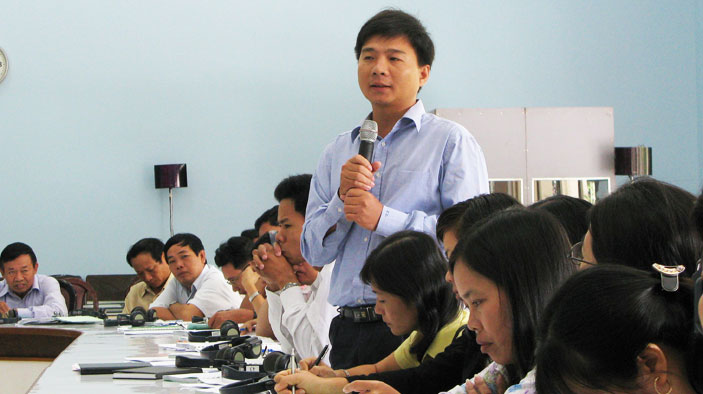Vietnam—Support for Trade Acceleration Project (STAR I, II, Plus)
Client: U.S. Agency for International Development
Duration: 2001-2013
Region: Asia and the Pacific
Country: Vietnam
Solutions: Governance
In December 2001, the governments of the United States and Vietnam signed a historic bilateral free trade agreement that promised to strengthen economic and political ties between the two countries. The U.S. Agency for International Development (USAID)-funded STAR (2001–2006)—the first major USAID technical assistance project in economic growth implemented in Vietnam since 1975—supported the Government of Vietnam in implementing the U.S.-Vietnam Bilateral Trade Agreement (BTA) and began reforms needed for accession to the World Trade Organization (WTO), which the country achieved in 2007.
Following on the enormous success of STAR I, STAR II (2006–2010) focused on supporting the development of institutional and administrative systems needed to implement the massive legal and regulatory changes that have been promulgated during this period in the areas of trade, commercial dispute settlement, intellectual property rights, foreign direct investment, and transparency and the right to appeal. These reforms were partnered with extensive educational programs that include training for officials, lawyers, judges, and business leaders; revision of university curricula and capacity development; and media-based public education campaigns. To respond to Vietnam’s evolving priorities, the STAR Plus (2010–2013) strategy included advising the Office of the Government, Ministry of Finance, and State Bank of Vietnam on macroeconomic policy, and ramping up Vietnam’s governance skills, systems, and processes at all levels. STAR Plus was flexible and demand-driven, and furthered Vietnam’s integration into the global economy as it continues its transition to a market-driven system.

Sample Activities
- Support systematic modernization of Vietnam’s legal, judicial, and administrative system.
- Develop institutional and human resource capacity through training and other support to help the country continue its transition to a market-driven economy.
- Implement intensive capacity building at local, provincial, and national levels through formal training and by working across government to break down institutional silos and barriers—clarifying roles among counterparts, building better coordination within government itself, and providing counterparts with systems and tools that enable them to fulfill their mandates.
Select Results
- The degree of change in the legal system due to STAR’s work has been dramatic: Vietnam moved from a hybrid legal framework based on Napoleonic Code and Russian law to a contemporary, rule-based, international best practice system. STAR supported the major revision or drafting of 166 laws, 555 workshops to introduce new laws and procedures; and 81 publications and references pertaining to the new legal regime.
- Provided an indispensable core foundation for commercial development. The project’s work on the Law on Laws, which applied WTO transparency standards to rule and law-making, went beyond individual commercial laws to alter the foundation of the legal system. The Law on Laws has been characterized as one of the most transformational legal reforms ever done in Vietnam.
- Enhanced judicial transparency through the publication of selected court decisions from 2002 to 2010 and established an e-portal for the Supreme People’s Court that is accessible to the public.
- Reduced barriers to trade through targeted support in such key issues as sanitary and phytosanitary standards and technical barriers to trade, thus moving the Vietnamese regulatory system closer to international standards, which facilitates trade.
- Although STAR concentrated on building the foundation for a new legal system, new commercial laws, systemic improvements, and liberalizing effects generated a flow of benefits to the Vietnamese business community. The shift in the business and investment climate opened new markets; foreign direct investment (FDI) created new firms and new opportunities for existing Vietnamese firms. The rapid growth in exports, FDI, and diversification of export production are tangible evidence that private sector actors responded to and benefited from the new business and investment opportunities opened up by the BTA (wherein the United States cut the import tariffs on Vietnamese exports from 40 to 4 percent) and WTO accession that was facilitated with technical assistance from STAR.
- Supported development of laws and rules governing the financial sector, including banking laws, securities laws, and securities regulations.
- Supported the creation of an early warning system at the State Bank.
RELATED CONTENT:
Jordan—Fiscal Reform Project II and Bridge Activity (FRP II, FRP Bridge)
By 2009, years of organic and poorly planned growth in the Kingdom of Jordan had produced a large and unwieldy government bureaucracy accounting for 13 percent of the national workforce.
Read More